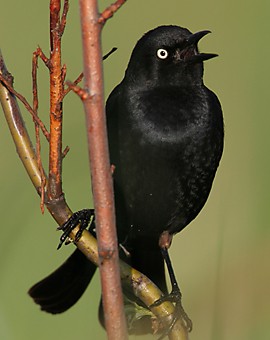by Evert Cilliers (aka Adam Ash) and Wallace Stevens

In 1917, Wallace Stevens, to my mind the best American poet of the 20th century (sorry, Sylvia Plath fans), published one of his most famous poems, “Thirteen Ways of Looking at a Blackbird.” What with Barack Obama being our first black President, and also a leader who elicits a variety of responses, from the sensible to the absurd, I thought it might be interesting to look at Obama through the lens of this poem.
(Note: this piece is shorter than my usual 8,000-word epic rants. Last month I wrote a 17,000-word saga, mixing stories about my strange family with social commentary and snippets of the history of South Africa, where I grew up. I didn't get the usual fifty plus readers comments, but the ones I got were so enthusiastic and heartfelt that I am honor-bound to repeat this personal anecdote/social commentary form again. I thank all those 3QDers who read the whole damn thing and expressed their thanks. You make me love what I do, and make me love 3QD for letting me do what I do. BTW, if you're brave enough to climb this Mt. Everest, google “The World Cup, my White Afrikaner Skin, my Fascist Parents, Mandela, Obama and Forgiveness.” And now on with a mercifully shorter piece.)
I
Among twenty snowy mountains,
The only moving thing
Was the eye of the blackbird.
The problem with Obama is the problem with democracy, as famously described by Churchill in a Commons speech in 1947, after the British voters repaid him for saving civilization by throwing him and his party out in 1945: “Democracy is the worst form of government, except for all those other forms that have been tried from time to time.” Obama is the worst form of president, except for all those other forms that have been tried from time to time. Today there are a few pols that are mildly interesting — Nancy Pelosi, Ron Paul, Anthony Wiener, Paul Ryan, Bernie Sanders, Howard Dean, Jeb Bush, Barney Frank, James Webb, Newt Gingrich, Alan Grayson — but none to match Barack Obama. Among the snowy mountains of Washington, his is the only eye worth catching. He can still summon the mojo to enchant a crowd (to see him in top form, google “realclearpolitics Obama: Republicans want to bamboozle you”).
However — and this is what makes Obama really interesting — he appears to have lost his progressive base somewhere between Air Force One and the White House urinal. Obama may be the smartest guy in any room, but when it comes to keeping his loyal base loyal, he has moved into full possession of an ear of tin, a tongue of lead, and a brain of plank.
II
I was of three minds,
Like a tree
In which there are three blackbirds.
Looking at candidate Obama in 2008, three mindsets pertain:
(a) Obama was the hope of the universe, the dawn of a new day, a progressive nation changer of unfathomable potential, an avatar of Dr King, Gandhi, Mandela and FDR.
(b) Obama was a socialist demon Nazi Hitler Lenin Antichrist Arab Muslim, the real-world manifestation of super-conservative America's worst hates and fears.
(c) Obama was a blank slate on whom we could all write ourselves; he was whatever you wanted him to be, a projection of your innermost desires, the change that was us that we were waiting for.
Read more »
